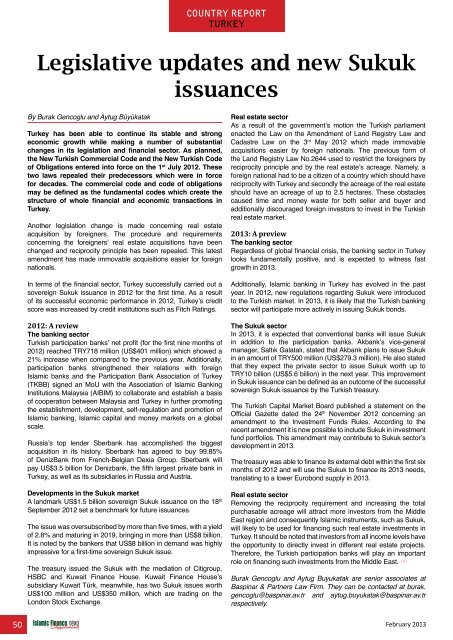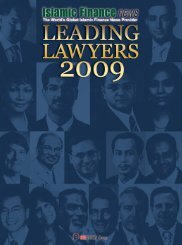View PDF Edition - Islamic Finance News
View PDF Edition - Islamic Finance News
View PDF Edition - Islamic Finance News
You also want an ePaper? Increase the reach of your titles
YUMPU automatically turns print PDFs into web optimized ePapers that Google loves.
country report<br />
TURKEY<br />
Legislative updates and new Sukuk<br />
issuances<br />
By Burak Gencoglu and Aytug Büyükatak<br />
Turkey has been able to continue its stable and strong<br />
economic growth while making a number of substantial<br />
changes in its legislation and financial sector. As planned,<br />
the New Turkish Commercial Code and the New Turkish Code<br />
of Obligations entered into force on the 1 st July 2012. These<br />
two laws repealed their predecessors which were in force<br />
for decades. The commercial code and code of obligations<br />
may be defined as the fundamental codes which create the<br />
structure of whole financial and economic transactions in<br />
Turkey.<br />
Another legislation change is made concerning real estate<br />
acquisition by foreigners. The procedure and requirements<br />
concerning the foreigners’ real estate acquisitions have been<br />
changed and reciprocity principle has been repealed. This latest<br />
amendment has made immovable acquisitions easier for foreign<br />
nationals.<br />
In terms of the financial sector, Turkey successfully carried out a<br />
sovereign Sukuk issuance in 2012 for the first time. As a result<br />
of its successful economic performance in 2012, Turkey’s credit<br />
score was increased by credit institutions such as Fitch Ratings.<br />
2012: A review<br />
The banking sector<br />
Turkish participation banks’ net profit (for the first nine months of<br />
2012) reached TRY718 million (US$401 million) which showed a<br />
21% increase when compared to the previous year. Additionally,<br />
participation banks strengthened their relations with foreign<br />
<strong>Islamic</strong> banks and the Participation Bank Association of Turkey<br />
(TKBB) signed an MoU with the Association of <strong>Islamic</strong> Banking<br />
Institutions Malaysia (AIBIM) to collaborate and establish a basis<br />
of cooperation between Malaysia and Turkey in further promoting<br />
the establishment, development, self-regulation and promotion of<br />
<strong>Islamic</strong> banking, <strong>Islamic</strong> capital and money markets on a global<br />
scale.<br />
Russia’s top lender Sberbank has accomplished the biggest<br />
acquisition in its history. Sberbank has agreed to buy 99.85%<br />
of DenizBank from French-Belgian Dexia Group. Sberbank will<br />
pay US$3.5 billion for Denizbank, the fifth largest private bank in<br />
Turkey, as well as its subsidiaries in Russia and Austria.<br />
Developments in the Sukuk market<br />
A landmark US$1.5 billion sovereign Sukuk issuance on the 18 th<br />
September 2012 set a benchmark for future issuances.<br />
The issue was oversubscribed by more than five times, with a yield<br />
of 2.8% and maturing in 2019, bringing in more than US$8 billion.<br />
It is noted by the bankers that US$8 billion in demand was highly<br />
impressive for a first-time sovereign Sukuk issue.<br />
The treasury issued the Sukuk with the mediation of Citigroup,<br />
HSBC and Kuwait <strong>Finance</strong> House. Kuwait <strong>Finance</strong> House’s<br />
subsidiary Kuwait Türk, meanwhile, has two Sukuk issues worth<br />
US$100 million and US$350 million, which are trading on the<br />
London Stock Exchange.<br />
Real estate sector<br />
As a result of the government’s motion the Turkish parliament<br />
enacted the Law on the Amendment of Land Registry Law and<br />
Cadastre Law on the 3 rd May 2012 which made immovable<br />
acquisitions easier by foreign nationals. The previous form of<br />
the Land Registry Law No.2644 used to restrict the foreigners by<br />
reciprocity principle and by the real estate’s acreage. Namely, a<br />
foreign national had to be a citizen of a country which should have<br />
reciprocity with Turkey and secondly the acreage of the real estate<br />
should have an acreage of up to 2.5 hectares. These obstacles<br />
caused time and money waste for both seller and buyer and<br />
additionally discouraged foreign investors to invest in the Turkish<br />
real estate market.<br />
2013: A preview<br />
The banking sector<br />
Regardless of global financial crisis, the banking sector in Turkey<br />
looks fundamentally positive, and is expected to witness fast<br />
growth in 2013.<br />
Additionally, <strong>Islamic</strong> banking in Turkey has evolved in the past<br />
year. In 2012, new regulations regarding Sukuk were introduced<br />
to the Turkish market. In 2013, it is likely that the Turkish banking<br />
sector will participate more actively in issuing Sukuk bonds.<br />
The Sukuk sector<br />
In 2013, it is expected that conventional banks will issue Sukuk<br />
in addition to the participation banks. Akbank’s vice-general<br />
manager, Saltık Galatalı, stated that Akbank plans to issue Sukuk<br />
in an amount of TRY500 million (US$279.3 million). He also stated<br />
that they expect the private sector to issue Sukuk worth up to<br />
TRY10 billion (US$5.6 billion) in the next year. This improvement<br />
in Sukuk issuance can be defined as an outcome of the successful<br />
sovereign Sukuk issuance by the Turkish treasury.<br />
The Turkish Capital Market Board published a statement on the<br />
Official Gazette dated the 24 th November 2012 concerning an<br />
amendment to the Investment Funds Rules. According to the<br />
recent amendment it is now possible to include Sukuk in investment<br />
fund portfolios. This amendment may contribute to Sukuk sector’s<br />
development in 2013.<br />
The treasury was able to finance its external debt within the first six<br />
months of 2012 and will use the Sukuk to finance its 2013 needs,<br />
translating to a lower Eurobond supply in 2013.<br />
Real estate sector<br />
Removing the reciprocity requirement and increasing the total<br />
purchasable acreage will attract more investors from the Middle<br />
East region and consequently <strong>Islamic</strong> instruments, such as Sukuk,<br />
will likely to be used for financing such real estate investments in<br />
Turkey. It should be noted that investors from all income levels have<br />
the opportunity to directly invest in different real estate projects.<br />
Therefore, the Turkish participation banks will play an important<br />
consulting www.<strong>Islamic</strong><strong>Finance</strong>Consulting.com<br />
www.<strong>Islamic</strong><strong>Finance</strong>Events.com<br />
role on financing such investments from the Middle East.<br />
www.<strong>Islamic</strong><strong>Finance</strong><strong>News</strong>.com<br />
www.<strong>Islamic</strong><strong>Finance</strong>Training.com<br />
www.MIFforum.com<br />
www.MIFmonthly.com<br />
www.MIFtraining.com<br />
www.REDmoneyBooks.com<br />
Burak Gencoglu and Aytug Buyukatak are senior associates at<br />
Baspinar & Partners Law Firm. They can be contacted at burak.<br />
gencoglu@baspinar.av.tr and aytug.buyukatak@baspinar.av.tr<br />
respectively.<br />
50 February 2013
















